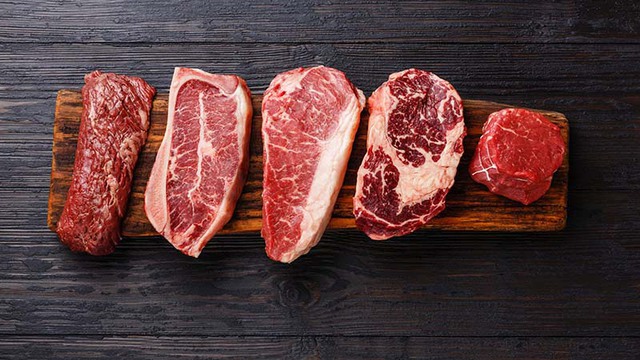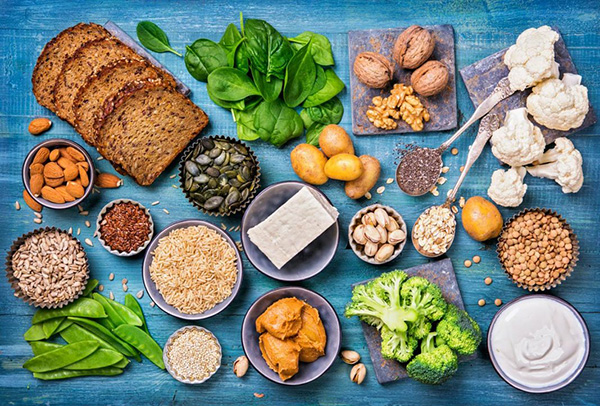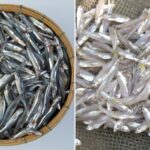Protein is an essential nutrient for the body, playing a crucial role in forming new cells and tissues, building and maintaining muscle mass, and participating in numerous other important biological processes, including cardiovascular function.
Protein helps maintain the elasticity of blood vessels and reduces the risk of atherosclerosis. Plant-based proteins are especially beneficial in lowering blood pressure by reducing levels of harmful cholesterol. Protein is also essential for building and regenerating heart muscle cells, strengthening the heart.
According to the National Institute of Nutrition’s 2016 recommendations, the daily protein requirement for adults (aged 19-30) with moderate labor is 74-68g for men and 63-60g for women. However, the exact amount for each individual depends on various factors such as protein absorption, lifestyle, metabolism, and daily physical activity.
When it comes to protein-rich foods, many people think of meat. However, meats, especially red meats, tend to have higher saturated fat content than poultry without skin, fish, and plant-based proteins. Saturated fat can increase blood cholesterol levels and the risk of heart disease. Therefore, it is essential to choose healthy protein sources that benefit cardiovascular health rather than solely relying on red meat.

Red meats are not a healthy source of protein.
2. Healthy Protein Sources for a Heart-Healthy Diet
The American Heart Association recommends choosing healthy proteins, mainly from plant sources, and regularly consuming fish and seafood. For those who eat meat or poultry, opt for lean, unprocessed cuts.
Fish
Fish is one of the best foods for overall health due to its high content of essential nutrients like protein, vitamins, and minerals, especially healthy omega-3 fatty acids. Fish is easy to digest and gentle on the gastrointestinal system, giving it an edge over animal-based proteins.
Of the three types of omega-3 fatty acids (DHA, EPA, and ALA), DHA and EPA are the most beneficial to health. They are predominantly found in oily fish such as sardines, herring, mackerel, cod, salmon, sardines, tuna, and sardines. Research indicates that DHA and EPA can reduce triglyceride levels and slow the buildup of plaque inside blood vessels. Omega-3s can also decrease inflammation in blood vessels, thereby protecting against cardiovascular disease.
Plant-based Proteins
Plant-based proteins are typically low in fat and cholesterol while being rich in vitamins, minerals, fiber, and antioxidants. They are considered a heart-healthy nutrient source, reducing the risk of stroke. Plant-based proteins include vegetables, fruits, whole grains, beans, legumes, nuts, and seeds.
Providing Fiber: Plant-based foods rich in fiber include vegetables, fruits, and whole grains, which can lower total and harmful cholesterol levels. Both are crucial in promoting blood flow through arteries by reducing plaque buildup.
Fruits and vegetables are packed with cholesterol-lowering components, including fiber, plant sterols, and stanols. Consuming ample fiber can also help lower blood pressure, prevent hypertension, and reduce stress on the heart. Soluble fiber, as found in oats and fruits, aids in reducing blood cholesterol levels.
High cholesterol levels, particularly harmful cholesterol, accelerate the development of atherosclerosis. The plaque buildup in artery walls narrows the vessels, impeding blood flow and increasing the risk of heart attacks and strokes.

Sources of plant-based proteins.
Supplying Omega-3 ALA: Omega-3 ALA is predominantly found in plant-based foods like walnuts, chia seeds, flaxseeds, peas, and spinach.
Providing Antioxidants: Fruits and vegetables are rich in plant compounds, notably Polyphenols, which act as antioxidants, protecting the body and neutralizing free radicals.
Free radicals are highly reactive oxygen molecules formed by normal cellular processes and external factors such as radiation, air pollution, smoking, and exposure to chemicals. Without antioxidants to neutralize free radicals, cells can become damaged, increasing the risk of chronic diseases like heart disease, diabetes, and cancer.
|
According to PGS.TS Vu Duc Dinh of the Vinmec International Hospital and an intensive care specialist, adopting a healthy diet can significantly reduce the risk of heart disease. A heart-healthy diet includes fish, lean meat, low-fat dairy, fruits and vegetables, nuts, whole grains, and beans, while limiting or avoiding saturated fats, added sugars, processed foods, fried foods, high-sodium foods, and excessive alcohol consumption. |
5 Foods to Boost Cardiovascular Health.
The Ultimate Superfood Fish: A Delicate, Nutritious, and Heart-Healthy Catch with Cancer-Fighting Powers – Now Affordable and Widely Available at Your Local Market.
Sea bass is a freshwater fish with delicate flesh and a rich nutritional profile. This affordable fish, widely available in Vietnam, boasts an array of health benefits, particularly for cardiovascular health and cancer prevention. With its tender meat and abundance of nutrients, sea bass is a delicious and wholesome addition to any meal.


































